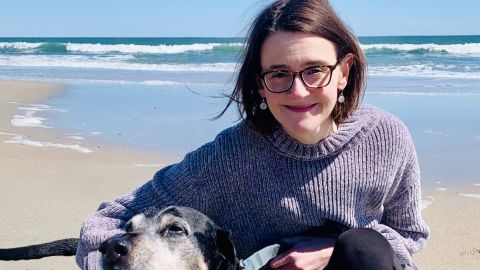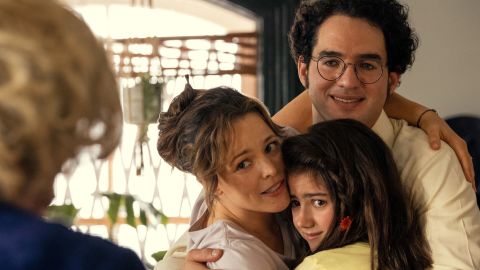Editor’s Note: Sara Stewart is a film and culture writer who lives in western Pennsylvania. The views expressed here are solely the author’s own. View more opinion articles on CNN.
CNN —
One of the brightest highlights of the recent Sundance Film Festival was the debut of the documentary “Judy Blume Forever,” a celebration of one of our country’s greatest young adult authors. It could have been simply a warm, nostalgic look back at a writer beloved by generations of readers. Instead, the film, which will be on Amazon Prime on April 21, has taken on a disturbing timeliness thanks to a bleak resurgence of censorship and book-banning in America. Blume’s state, Florida, has been in the spotlight this week for a new set of book-regulating laws in schools that recall, as CNN’s Don Lemon put it, the 1950s.

It’s a dark time to be a young reader in this country – so it couldn’t be a better time for a Blume renaissance. Between the documentary and this spring’s release of the promising film adaptation of “Are You There God, It’s Me, Margaret,” 2023 is set to be a banner year for her. Like Dolly Parton and her free-books program, Blume is one of our true national treasures and a hero to kids everywhere. As “Judy Blume Forever” co-director Leah Wolchok said at the festival, Blume is “a fierce warrior, and really wants to defend all authors whose books are being challenged and banned, and stand up for the freedom to read, freedom of speech and women’s autonomy.”
To say Blume is widely loved would be an understatement, as the documentary shows: it features interviews with some of the author’s more famous adoring fans, including Molly Ringwald, Samantha Bee and Lena Dunham. It also showcases her correspondence with now-adult women who wrote to Blume, initially, as teenagers – and she wrote back, beginning friendships that would last decades.
All of these women speak about the ways Blume’s books changed them, made them feel seen and understood in a way that their parents often did not. There were few formative issues that Blume’s body of work didn’t touch on. Menstrual periods and religion and crushes in “Margaret.” Scoliosis and controlling parents and masturbation in “Deenie.” Teen sex in “Forever,” which Blume says she wrote because her daughter wanted to read a book about high schoolers who, unlike virtually most of canonical Western literature’s characters, had sex outside wedlock and didn’t come to a tragic end.

You would think the 84-year-old author would have earned a laid-back existence in her home of Key West, but no. As Matthew McConaughey once said, time is a flat circle. In “Judy Blume Forever,” the funny, charismatic author recalls the moment everything changed for her career: with the election of Ronald Reagan in 1980, as she also told NPR.
“When I started to write, it was the ’70s, and throughout that decade, we didn’t have any problems with book challenges or censorship. It all started really in a big way in 1980… It came with the election, the presidential election of 1980, and the next day, I’ve been told, the censors were crawling out of the woodwork and challenging, like, ‘It’s our turn now, and we’re going to say what we don’t want our children to read.’”
The more things change? Today’s GOP seems even more hellbent on making sure kids don’t have access to literature that challenges an extreme right-wing view of what’s culturally acceptable. On Monday, a video of empty bookshelves in a Manatee County classroom went viral, visual evidence of the state’s new rules that dictate pre-approval by state authorities over what kids can read. And in Texas last winter, Blume’s own books “Blubber” – which discussed bullying long before the word was commonly being used in schools – and “Margaret” were two of 850 challenged titles.

One of Blume’s lesser-known early books, “Iggie’s House,” is about a tween girl whose new suburban neighbors are a Black family who encounter racism in their new community. Depressingly, its themes seem anything but dated. As the Washington Post reported last year, the current wave of book banning is centered largely on books about race, as well as gender. “We see these efforts to narrow what is available to young people in an effect to preserve a status quo that valorizes the Founding Fathers and that is theoretically colorblind, but that seems not to include the actual voices of the people who have been impacted by racism or discrimination in our society,” Deborah Caldwell-Stone, director of the American Library Association’s Office for Intellectual Freedom, told the paper.
The Blume documentary wasn’t the only spotlight on author censorship at Sundance. “The Disappearance of Shere Hite” is about the author of 1976’s “The Hite Report: A Nationwide Study of Female Sexuality,” a groundbreaking survey of women that concluded the female orgasm was a lot less elusive than had been previously discussed – mostly due to faulty or nonexistent understanding of women’s sexual pleasure. “After publication, Hite was lambasted for being a man-hater and berated by the Christian right for destroying traditional family values,” the New York Times reported.
Hite died in 2020 in London, having renounced her citizenship after years of persecution for her work. But Blume is still fighting the good fight. She is the co-founder of a Key West store, Books & Books @ the Studios of Key West (affiliated with a local Florida chain of beloved independent bookstores), where the shelves bear signs proclaiming, “We Sell Banned Books.”
She’s been a cheerleader for other authors whose books have come under attack, like Stephen Chbosky and his novel “The Perks of Being a Wallflower.” And she never tires of explaining why it’s so important to get a wide range of smart books into the hands of young readers, as she did in 2021 in accepting the Free Speech Lifetime Achievement Award from the National Coalition Against Censorship.
“I wanted to write honestly for kids because that’s what I wanted to read when I was young,” she said in it. “Some individuals and groups tried to ban my books thinking, if they don’t read about it, they won’t know about it, and if they don’t know about it, it will never happen to them, and then I’ll never have to answer any of their questions. Well, we all know that’s not how it works.”
I might hope the book-banning contingent – who often haven’t read the titles they’re trying to remove – will heed her words. But then again, maybe I won’t.


